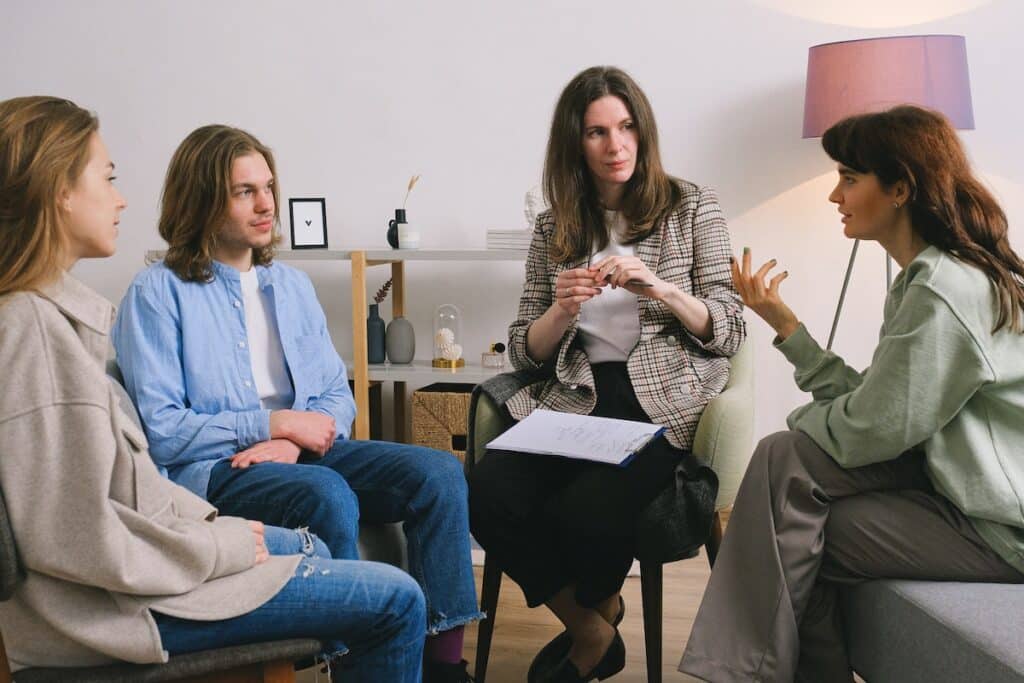Think of your family as a fascinating puzzle, filled with distinctive pieces that fit together, achieving harmony despite their unique shapes and colours. But what happens when a few pieces seem to drift apart? You can turn to family therapy to help you and your loved ones understand the bigger picture, reconnect the distant parts, and restore balance.
If you’re considering family therapy in Dublin, proper preparation and knowing what to expect will go a long way in ensuring you get the most out of each session. So, read on and learn about family therapy, including its benefits as well as tips on selecting the right therapist and preparing for your sessions to ensure a smooth experience.
Family Therapy Dublin: An Overview
What Is Family Therapy? What Are Its Benefits?
Family therapy offers a lifeline to families needing help navigating their unique obstacles. It is a specialised form of psychotherapy that goes beyond individual healing and zeroes in on the intricate web of relationships within a family unit. It focuses on improving communication, resolving conflicts, and enhancing relationships.
In Dublin – a city teeming with diverse families, counselling or therapy serves as a vital resource, providing a safe and supportive environment where families can address their unique challenges head-on. Whether it’s communication breakdowns, unresolved conflicts, or complex parent-child relationships, family counselling is an essential tool that can help resolve these hurdles and foster positive changes.
Family therapists in Dublin employ a range of therapeutic approaches to tackle the complexities of familial issues. These approaches typically include:
- Structural family therapy
- Systemic family therapy
- Narrative therapy
- Cognitive-behavioural therapy (CBT)
- Solution-focused brief therapy
It is worth mentioning that family counsellors or therapists in Dublin integrate Irish cultural values and family dynamics into their practice, which allows them to empathise well with clients and foster meaningful connections. By tailoring their approach based on the family’s specific needs and cultural context, therapists craft individualised interventions for more effective outcomes.
Who Can Benefit From Getting Family Counselling?
This form of therapy is a valuable resource for families dealing with a variety of challenges, such as:
- mental health issues
- childhood behaviour problems
- life transitions
- marital discord
Counselling is a powerful and empowering experience that brings families closer together, fostering understanding, harmony, and a brighter future for all. With the help of skilled therapists, Dublin families like yours can embark on a transformative journey, working together to enhance the overall well-being of their family unit.
How to Choose a Family Counsellor in Dublin
Selecting the right family therapist is paramount to the success of your therapy journey. In Dublin, there are numerous qualified and experienced professionals to choose from.
To find the right one for you and your family, it is essential to conduct thorough research and consider the following factors:
Qualifications and Experience
A well-qualified therapist or counsellor is crucial for effective family therapy. Look for practitioners with a degree in family therapy, psychology, or counselling, and consider their expertise and years of experience.
Specialisation
Family therapists may have areas of specialisation, such as mental health, or relationship issues. Choose a therapist whose expertise aligns with your family’s needs.
Personality and Connection
The therapeutic relationship is crucial to a successful outcome. Find a therapist who demonstrates empathy, understanding, and rapport.
Affordability
Some therapists might operate on a sliding scale basis, depending on income, so don’t hesitate to discuss fees upfront. Also, investigate if your health insurance covers family therapy.
Cultural and Linguistic Competency
The counsellor’s capability to respect and understand your family’s culture and language plays a crucial role in the therapy’s effectiveness. It’s essential to find a therapist sensitive to cultural variances and can potentially communicate in your family’s preferred language, if necessary.
Approach to Treatment
Different therapists utilise different therapeutic approaches. Some may use a solution-focused method, while others use a cognitive-behavioural strategy. Understanding these approaches can help you find a method that suits your family.
Location and Accessibility
The counsellor’s location can significantly influence the consistency of your sessions. Opt for a therapist within a manageable distance from your home or work.
Ultimately, when looking for a Dublin family counsellor, prioritise those with the necessary education, training, and experience. They should have a strong understanding of family systems theory and practical expertise in working with families.
Seek recommendations from trustworthy sources, such as friends, family, or healthcare professionals, who can provide insight into reputable therapists in the area. You can also consult professional directories or search online.
Just a reminder:
When searching online, make sure to use specific search terms. For example, if you want someone who is experienced in dealing with kids, key in “family therapist Dublin children”. Also, never pick a clinic or therapist just because they appear on top of the search results. Do your due diligence. Gather information about them first.
How Much Does Family Therapy in Dublin Cost?
The cost of a family therapy session in Dublin ranges from €35 to €200 per hour, depending on various factors such as the counsellor’s experience, the location of the practice, and whether insurance coverage is available.
One of the primary factors that can influence the cost of family therapy is the qualifications and experience of the therapist. Highly qualified therapists with extensive experience may have higher fees due to their expertise and track record of success. On the other hand, therapists who are still gaining experience or working in training settings may offer more affordable rates.
For example, at Access Counselling – a reputable Dublin-based clinic, family therapy costs start at €75 for fully qualified psychotherapists. The clinic also offers low-cost family therapy starting at €35, which is handled by qualified student therapists.
While price is an important consideration, it’s crucial to also weigh the potential long-term benefits for your family’s well-being and relationship dynamics. That being said, investing in a quality therapist matters. A more experienced therapist may charge a higher fee but is likely to provide more effective help.
Openly discussing your financial situation and therapy costs with your counsellor can be beneficial in finding a payment plan that suits your budget. As mentioned earlier, some therapists may also offer sliding scale fees, which adjust the cost based on your income or financial situation.
Additionally, many health insurance policies include mental health benefits, which can help ease the financial burden. Consult your insurance company to assess your coverage and inquire about available options for financial assistance.
Preparing for Your Family Counselling Sessions in Dublin
To ensure that your family therapy sessions are productive and effective, it’s essential to prepare adequately. Concrete preparation helps establish a clear and purposeful direction for therapy, promoting effective communication and achieving faster progress.
Below are some tips on how you can maximise the benefits of your family therapy experience:
Identify Key Issues
Before your first session, compile a list of the primary issues, conflicts, or challenges your family is grappling with. These points can range from communication breakdowns and trust issues to behavioural problems and coping with significant life changes like death in the family. Having this list not only helps you articulate your concerns more clearly but also provides a foundation for the therapist to understand your family dynamics better.
Establish Therapy Goals
Reflect individually and as a family on what you hope to obtain from the family counselling sessions. Are you seeking better communication, conflict resolution, behavioural change, or enhanced understanding between family members? Setting these goals from the outset can help guide therapy, enabling your counsellor to align their strategies and techniques with your family’s expectations.
Familiarise Yourself With the Process
Make sure you understand the therapy framework, including the session’s structure, duration, frequency, and payment options. Knowing these details can alleviate anxiety and help you focus on the therapeutic process itself.
Participate Actively
Aim to engage proactively in the therapy sessions. Voice your concerns, thoughts, and feelings honestly and listen attentively when other family members share their perspectives. Being open to feedback, even when challenging, will contribute significantly towards building trust within the family and with the therapist.
Prepare Mentally
It’s necessary to mentally prepare for therapy as it often involves discussing difficult and sensitive issues. You may experience a range of emotions but remember that this is a normal part of the therapeutic process.
Be Open to Change
Therapy involves change which can be unsettling or uncomfortable. Be prepared to explore new ways of relating to each other, change your patterns of behaviour, and face habits and behaviours that could be damaging.
Remember, family therapy is a partnership. Your active involvement and openness are crucial in driving progress and achieving your therapy goals. By preparing diligently for your sessions and wholeheartedly embracing the process, you will pave the way for profound growth and lasting change.
Evaluate Your Progress
Throughout the therapy process, track your progress with your therapist and reassess your goals periodically. Be prepared for potential adjustments in response to new insights or evolving family dynamics. Ultimately, when you and your therapist agree that your objectives have been met, you’ll transition towards closure, solidifying the skills and strategies learned to foster continued growth and resilience.
Family Therapy Dublin – What to Expect During Your Sessions
One common concern for families embarking on therapy is uncertainty about what to expect. If you have the same worry, it’s essential to familiarise yourself with the process to ease your anxiety and enable your family to focus on achieving progress.
Here’s a quick guide to help you understand the family therapy process:
Session Duration and Frequency
Family counselling sessions usually last between 50 to 90 minutes, with the frequency of meetings varying according to your family’s individual needs and circumstances. Therapy may be provided on a weekly, bi-weekly, or monthly basis. The total number of sessions will depend on your progress and the goals established with your therapist.
Therapeutic Techniques
Qualified family therapists in Dublin employ an array of techniques to facilitate the exploration and discovery of patterns, behaviours, and emotions. Some of the most common methods include:
Group discussions: Engaging the entire family in open conversations to gain insight into each member’s thoughts, feelings, and perspectives.
Role-playing: Enacting specific situations to uncover underlying issues and better understand each other’s reactions and emotions.
Behavioural exercises: Working through practical tasks and challenges to identify and develop healthier communication and coping strategies.
Individual sessions: Addressing personal issues that might affect the family dynamic, enabling each member to constructively explore their role within the family.
Navigating Confidentiality Concerns and Blame
Confidentiality is a common concern for families entering therapy. Before beginning treatment, discuss the counsellor’s obligations and the limits of confidentiality to ensure clarity and mutual understanding. Typically, the information shared during sessions remains confidential, with certain exceptions, such as concerns about safety and legal requirements.
Family members might also worry about feeling blamed or singled out. It’s crucial to remember that a skilled therapist’s goal is to uncover patterns, facilitate understanding, and work towards resolution, not to place blame on individual family members. The counsellor will guide the family towards healthier relationships, fostering mutual respect, empathy, and open communication.
In conclusion, family therapy can be the guiding light you and your loved ones need to achieve healthier, more resilient relationships amidst the challenges that life throws your way. Through diligent preparation, finding the right therapist, and wholehearted engagement in the therapeutic process, you equip your family with the tools needed to handle complex emotions and conflicts effectively.
By taking the empowering step of talking to a counsellor, you are committing to fostering understanding, empathy, and harmony within your family unit. So, don’t wait another day to transform your family’s dynamics and create a more supportive and loving environment. Connect with a seasoned family therapist in Dublin today and begin this profoundly impactful journey that will undoubtedly improve your family’s relationships and well-being.
Is there a conflict in your family you want to resolve? Or do you simply want to improve communication among your loved ones? We can help with our effective yet compassionate family therapy in Dublin. Call us today on 015240708 or email info@accesscounselling.ie to learn more about how our IACP-approved family therapists can help you.
Royalty-free images supplied from Pexels as part of SEO service from 3R








